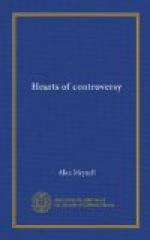It was said for many years, until the reversal that now befalls the sayings of many years had happened to this also, that Thackeray was the unkind satirist and Dickens the kind humourist. The truth seems to be that Dickens imagined more evil people than did Thackeray, but that he had an eager faith in good ones. Nothing places him so entirely out of date as his trust in human sanctity, his love of it, his hope for it, his leap at it. He saw it in a woman’s face first met, and drew it to himself in a man’s hand first grasped. He looked keenly for it. And if he associated minor degrees of goodness with any kind of folly or mental ineptitude, he did not so relate sanctity; though he gave it, for companion, ignorance; and joined the two, in Joe Gargery, most tenderly. We might paraphrase, in regard to these two great authors, Dr. Johnson’s famous sentence: “Marriage has many pains, but celibacy has no joys.” Dickens has many scoundrels, but Thackeray has no saints. Helen Pendennis is not holy, for she is unjust and cruel; Amelia is not holy, for she is an egoist in love; Lady Castlewood is not holy, for she too is cruel; and even Lady Jane is not holy, for she is jealous; nor is Colonel Newcome holy, for he is haughty; nor Dobbin, for he turns with a taunt upon a plain sister; nor Esmond, for he squanders his best years in love for a material beauty; and these are the best of his good people. And readers have been taught to praise the work of him who makes none perfect; one does not meet perfect people in trains or at dinner, and this seemed good cause that the novelist should be praised for his moderation; it seemed to imitate the usual measure and moderation of nature.
But Charles Dickens closed with a divine purpose divinely different. He consented to the counsels of perfection. And thus he made Joe Gargery, not a man one might easily find in a forge; and Esther Summerson, not a girl one may easily meet at a dance; and Little Dorrit, who does not come to do a day’s sewing; not that the man and the women are inconceivable, but that they are unfortunately improbable. They are creatures created through a creating mind that worked its six days for the love of good, and never rested until the seventh, the final Sabbath. But granting that they are the counterpart, the heavenly side, of caricature, this is not to condemn them. Since when has caricature ceased to be an art good for man—an honest game between him and nature? It is a tenable opinion that frank caricature is a better incident of art than the mere exaggeration which is the more modern practice. The words mean the same thing in their origin—an overloading. But, as we now generally delimit the words, they differ. Caricature, when it has the grotesque inspiration, makes for laughter, and when it has the celestial, makes for admiration; in either case there is a good understanding between the author and the reader, or between the draughtsman and the spectator. We need not, for example,




